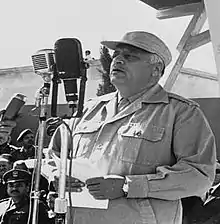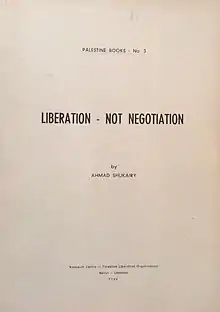Ahmad Shukeiri
Ahmad al-Shukeiri (Arabic: أحمد الشقيري, also transliterated al-Shuqayri, Shuqairi, Shuqeiri, Shukeiry; 1 January 1908 – 26 February 1980) was the first Chairman of the Palestinian Liberation Organization, serving from 1964–1967.
Ahmad al-Shukeiri أحمد الشقيري | |
|---|---|
 | |
| 1st Chairman of the Palestine Liberation Organization | |
| In office 28 May 1964 – 24 December 1967 | |
| Preceded by | Position established |
| Succeeded by | Yahya Hammuda |
| Personal details | |
| Born | 1 January 1908 Tebnine, Ottoman Empire |
| Died | 26 February 1980 (aged 72) Amman, Jordan |
| Nationality | Palestinian |

Early life
Shukeiri was born in Tebnine, south Lebanon then Ottoman Empire to a Turkish mother and a Palestinian father, As'ad Shukeiri (1860–1940) (who was elected to the Ottoman Parliament in 1908 and 1912[1]). Ahmad acquired the Turkish language from his mother. After studying law in the British law college in Jerusalem, he became a prominent lawyer in British-Palestine and a member of the Independence Party. In 1945 he went to Washington, D.C. to establish a Palestinian office and in 1946 joined the Arab Higher Committee.
Political career
Shukeiri was a member of the Syrian delegation to the United Nations from 1949 to 1951. He then became assistant Secretary General for the Arab League from 1950–1956, Saudi ambassador to the United Nations from 1957 to 1962. At the 1964 Arab League summit (Cairo), he was given a mandate to initiate contacts aimed at establishing a Palestinian entity.
In December 1962, representing Saudi Arabia, he told the Special Political Committee of the United Nations General Assembly that the Tacuara movement had been formed to combat Zionism and he hoped it would spread in Latin America and its principles adopted by the United Nations.[2] After receiving information about Tacuara from the Argentinian and Chilean delegations, he backed down, acknowledging that Tacuara was a fascist movement and claiming instead that it was more appropriate to compare Tacuara to Israel.[3]
Chairman of the PLO
In May 1964, he was elected the first Chairman of the PLO (Palestine Liberation Organization) with the support of Egyptian leader Gamal Abdel Nasser.[4] He resigned in December 1967 in the aftermath of the Six-Day War in June. His enemies and opponents used him as a scapegoat.[5]
From 28 May to 2 June 1964 Shukeiri and 396 nominated representatives from Jordan, Syria, Lebanon, the Gaza strip, Egypt, Qatar, Kuwait, Libya and Iraq attended a Palestinian Conference (the First Palestinian National Council in East Jerusalem). Delegates wore badges carrying a map of Palestine and inscribed "We shall return". The Times reported that following an introductory address by King Hussein of Jordan, Shukeiri told delegates that "Palestinians had experienced 16 years' misery and it was time they relied on themselves and liberated Palestine from the Israelis". The conference announced the establishment of the PLO as the representative of the Palestinian Arabs. Shukeiri and his colleagues also announced the formation of the Palestinian National Fund, and at the Second Arab Summit Conference in Alexandria in September 1964 of a military wing, the Palestine Liberation Army.
Prior to the Six Day War, Shukeiri was reported to have threatened to "throw the Jews into the sea" and, when asked about Israel-born Jews, he said that "Whoever survives will stay in Filastin, but in my opinion no one will remain alive". These statements gained little attention at the time but after the war they were used as part of the Israeli government's justification of their initiation of the war. Shukeiri consistently denied having made such a statement; his denial was not printed in most Western press, but was reported on French radio in September 1967:[6]
I stated exactly the opposite. I was in Amman two days before the Israeli aggression and was asked at a press conference if we would throw the Jews into the sea if the Arabs won the war. I immediately answered this question and said that we have no desire to throw the Jews into the sea nor do we want to annihilate the Jews. But Jewish sources twisted these statements around, and as you know Zionism is expert at lying and distorting things.
Moshe Shemesh writes that he probably meant to send the European Jews by sea to Europe while his second statement had a genocidal meaning.[6]
Shukeiri was succeeded as chairman of PLO by Yahya Hammuda in December 1967.
Later life
Between 1968 and 1979, Shukeiri wrote more than twenty books dealing with the Palestinian cause and the Arab Unity. He died on 26 February 1980 aged 72 in Amman, Jordan.[7]

Notes
- Palestine Facts, Personalities – Chronological Listing, 1880–1920 Archived 28 November 2005 at the Wayback Machine, PASSIA.org
- United Nations General Assembly, Special Political Committee, 359th meeting, 30 November 1962, A/SPC/SR.359, paragraph 16.
- United Nations General Assembly, Special Political Committee, 361st meeting, 3 December 1962, A/SPC/SR.361, paragraph 38.
- Sharnoff, Michael (2017). Nasser's Peace: Egypt's Response to the 1967 War with Israel. London: Taylor & Francis. p. 17. ISBN 1412865158.
- Moshe Shemesh, "Did Shuqayri Call For ‘Throwing the Jews into the Sea?’" Israel Studies, Summer 2003, p. 70
- Shemesh, Moshe. “Did Shuqayri Call for ‘Throwing the Jews into the Sea’?” Israel Studies 8, no. 2 (2003): 70–81. JSTOR 30247797.
- "Mr Ahmed Shukeiri". The Times. No. 60561. 27 February 1980. Retrieved 21 October 2023.
References
- 'Arab Move To Free Palestine: "16 Years Of Misery"', From Our Correspondent, The Times, Saturday, 30 May 1964; p. 7; Issue 56025; col D.
- Connell, Dan (2001). Rethinking Revolution: New Strategies for Democracy & Social Justice. The Red Sea Press. ISBN 1569021457
- 'Mr Ahmed Shukeiri', Obituary, The Times, Wednesday, 27 February 1980; p. 16; Issue 60561; col H.
- Arieh Avneri, The Claim of Dispossession: Jewish Land-Settlement and the Arabs 1878–1948 (London: Transaction Books, 2002) p. 233.
- Encyclopaedia Palaestina, Micropaedia, 1st volume, pp. 98–100.
External links
- Biography of Ahmad Al-Shukairy Archived 8 November 2021 at the Wayback Machine